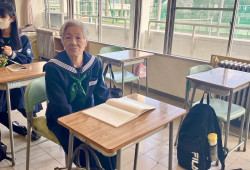
February 14, 2019
An Individual Story
Individuality in the nation of homogeneity
I grew up in an urban center in the quiet prefecture of Iwate. Here, my life was comprised of a single community in which everyone knew each other. It was simply impossible to be anonymous, as many of us feel we are in Tokyo. Beyond anonymity, life in Tokyo gives me a sense of the “international” everyday. I sometimes finish a day having spoken only English. Everywhere I go, I see foreigners. I like this diversity, but it wasn’t easy for me to come to feel this way.
My high school was known as one of the best high schools in town. Everybody wanted to study there and admission into the school was treated with the same reverence as a job offer from the most prestigious company in the world might be. Students of this school were admired and respected, by their peers and relatives, for their achievements in the school. In my case, however, none of that appealed to me. I wasn’t proud of myself for having attended this school. Rather, I ended up feeling that my identity was overshadowed by the school’s reputation and people saw me as a part of the school, not as myself.
By my final year of high school, while university wasn’t a prospect that excited me, the idea of going was cemented in my mind because it was what everyone did. My main motivation (which was presumably the case for many other people from the countryside) was to get away from my small town, rather than study something that interested me.
My Tokyo debut went well — I made a lot of friends at university and enjoyed ticking off boxes from my “If I lived in Tokyo” bucket list. Yet the feeling of being anonymous, as well as having an individual identity, still evaded me. The community of my high school alumni in Tokyo was strong and if I wasn’t boxed in with them, I was boxed in with my university’s community and reputation.
The turning point in my life finally came when I was in my fourth year of university, during which I made the decision to take two years off from university and go to the UK to study. Living abroad had been one of my dreams and I wasn’t disappointed by my experience. If anything, two years wasn’t enough to learn the culture, society and systems that made my favorite country. I loved feeling that no one knew me or where I came from. I branched out, beyond the Japanese community. I challenged myself to see how much I could blend into British culture as a foreigner.
One day in Leeds, I watched some Japanese students as they organised a Japanese festival with the intention of exhibiting “real Japanese culture”. I wondered: what does “real Japanese culture” mean? And what sense of obligation did these students have, leading them to feel they had to represent Japan? It’s not as if we were Olympic athletes, representing Japan to the world. We were just students, not cultural ambassadors. We were foreigners in the UK — shouldn’t we just appreciate this culture? We could never know the struggles foreign residents in Japan might have, without the experience of being a foreigner ourselves.
I’m not writing to encourage Japanese people to travel or learn to speak English. I’m writing because I made my own decision — one that my parents hadn’t chosen, one that didn’t cave to social pressure. It felt right and while I’m not entirely sure how my experiences abroad will help me in the future, today I am confident I made the right decision. Those two years made me what I am today.
2018 turned out to be a year of diversity. We saw countless political arguments and people fighting for their rights all around the world. Japan continues to take in more foreign residents but 2018 witnessed a turning point in the political mentality, opening up to diversity. But we haven’t come to the societal realisation that diversity isn’t limited to foreigners yet. We haven’t opened up to diversity within Japanese people, really.
My time in the UK awakened a version of me that had always been hushed here, but why? We are not all the same. Not every Japanese person has black hair or speaks Japanese the same way and, beyond that, looking similar doesn’t necessarily mean we all share the same background. We do not all have to be representative of one version of Japan. It’s okay that Naomi Osaka looks different and it’s also important to remind ourselves that her success isn’t owned by Japan and its citizens — it is hers alone.
I hope 2019 is a year in which everyone is comfortable being who they are and doing what they want. Surely, the first step in accepting diverse peoples from beyond our borders is accepting that even within our borders, we are all different.







